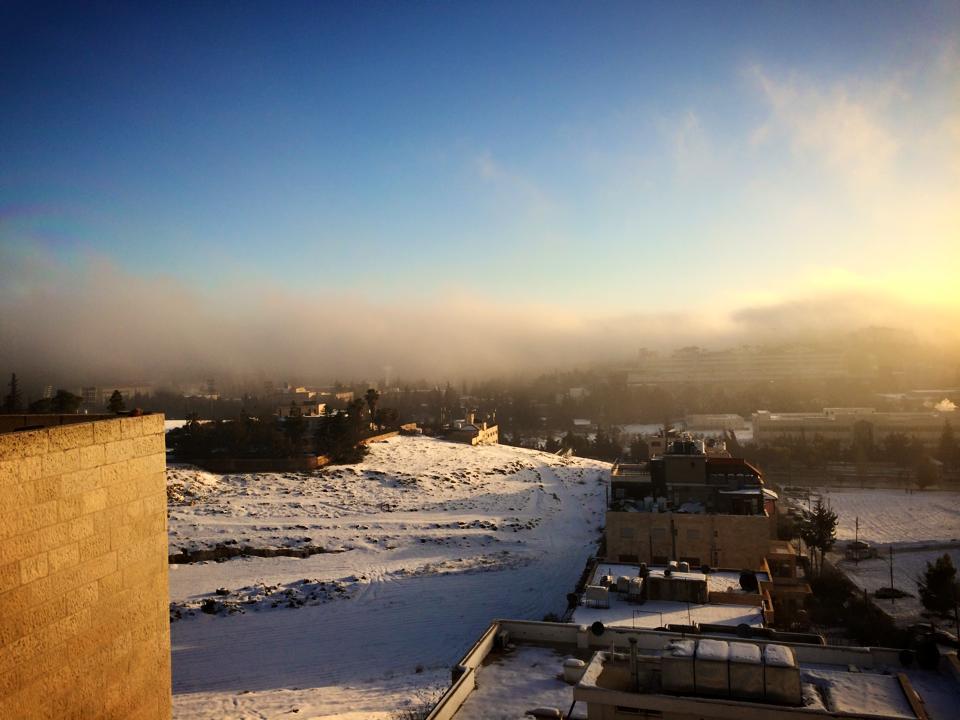
It’s 1 pm on February 18, 2015, and ACOR’s Chief Financial Officer, Nisreen Abu Al Shaikh, is pacing ACOR’s foyer, talking on a cellphone in Arabic. Behind her, a paper announcement reads that ACOR will close early the next day in preparation for a snowstorm. Outside smoggy clouds hover between the city and the sun, looking too thin and sickly to hold the predicted barrage of snow.
Inside, however, snow dominates the conversation, often with facts playing second to whispered rumor. Allison Mickel, a Ph.D. candidate at Stanford University and a member of ACOR’s Temple of the Winged Lions project, has stopped listening. “For the past three weeks I’ve been hearing it’s supposed to snow ‘tomorrow,’ even on days when it was in the 70s and sunny,” she said, explaining why she’s not concerned about the upcoming storm. The snow rumors in Jordan function like a schoolyard game of telephone. The storm is predicted to last two nights, then three, then through the next week. Conversations around tables in ACOR’s library and lunchroom feature an ongoing struggle between calm speakers with smartphone weather predictions and skeptically raised eyebrows, and wide-eyed snowvangelists, passionately certain in their predictions of an apocalyptic storm.
Nisreen isn’t phased by these rumors, but she’s hearing them, too. “In the streets whatever you hear they are scared of snow and, I don’t know, it’s a big deal maybe. People will stock food as if it will be the end of the world. I heard from one person there will be 16 hours of continuous snow, and another told me 30 hours of continuous snow.”
Library Assistant Samya Kafafi is hearing similar news, and has made sure to supply her home with necessary provisions. “We want to be ready before the snow, to buy bread and a lot of things,” she said. Samya’s local bakeries were practically empty the day before, with buyers clearing the shelves faster than the bakers could replenish them.
“I think snow being rare has a lot to do with it,” said Allison, explaining why she thinks the rumors are so prevalent. “Because it can be so catastrophic, it’s worth it to prepare for the worst, mentally.” This coming front, however, is corroborated by both meteorological predictions and Instagram feeds, tracking the storm as it dumps snow on neighboring countries on its march towards Jordan. Within a few hours, the government revises its earlier recommendation and instructs all non-essential businesses to close the entire next day. This includes ACOR, which follows the government on all holidays and emergency closures. But being both a research center and a residence, ACOR’s hostel has to continue functioning even during blizzards.

“In my nine years here there have been probably about six times when we’ve closed for certain periods of time due to snow,” said ACOR Director Dr. Barbara A. Porter, who also resides at ACOR. “Fortunately, this building is always well-provisioned.” This includes a kitchen full of basic staples and leftovers from the previous day’s meals, running water, and heat. In recent snowstorms, ACOR has also been able to keep its internet access and electricity, though the television satellite dish, located on the roof, often goes out.
Heating ACOR is the real priority during storms, as most buildings in Jordan rely on diesel fuel, and ACOR’s location on top of a steep icy hill makes it less accessible for the diesel trucks during storms. In December 2013, Amman was slammed with a snowstorm that isolated ACOR for a full week, and rationing became a necessity. “That week, we were very conservative because we also realized that the trucks can’t get to ACOR when there’s major snow, because our driveway isn’t plowed. It took six days for our driveway to be plowed, so we had to be very, very cautious,” explained Barbara.
Another of ACOR’s less tangible functions continues during snowstorms, and in some respects gets stronger; as fellows and residents spend time together, connections strengthen, engendering a sense of both friendly and collegial networking.

“One of the things that I’ve always found in these snowstorms is how much fun we can have together,” explained Barbara. “There’s a sense of camaraderie.” Indeed, as the weather raged outside over the next few days, dumping over a foot of snow during thunderstorms that physically shook the windows, residents continued connecting. They gathered over group meals cooked by fellow residents, played board games, staged a scratch-paper indoor snowball fight, and binge-watched episodes of Twin Peaks. A similar snowstorm in January saw a marathon session of pirogi-making, tournaments of Trivial Pursuit, and a menagerie of snow animals, including a life-sized winged lion conceived by ACOR-CAORC fellow Alex Brey to commemorate ACOR’s flagship project in Petra.
Barbara says snowstorms often play out like this, presenting a tremendous opportunity for residents to connect. The December 2013 storm may best be remembered not for the cold or the snowfall, but as the time when ACOR residents watched the entire BBC series Fortunes of War. “It was a blast!” Barbara remembers. “We just watched and commented and shared whatever we all had, and that’s the really cool part of a snowstorm.”
By 10 am on Sunday, February 22, 2015, the snow outside was beginning to melt and ACOR opened its doors again, returning to its normal function of providing a learning environment for students, scholars, and archaeologists who rely on the building’s library, wifi, and free house-brewed coffee.
Written by Sarah Oeffler


Thanks for your blog Lots of nice words in this article , nice to read , Do not stop.